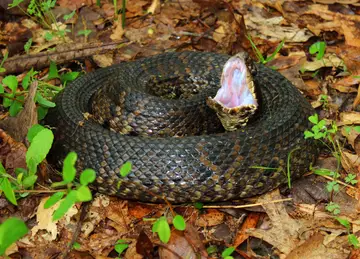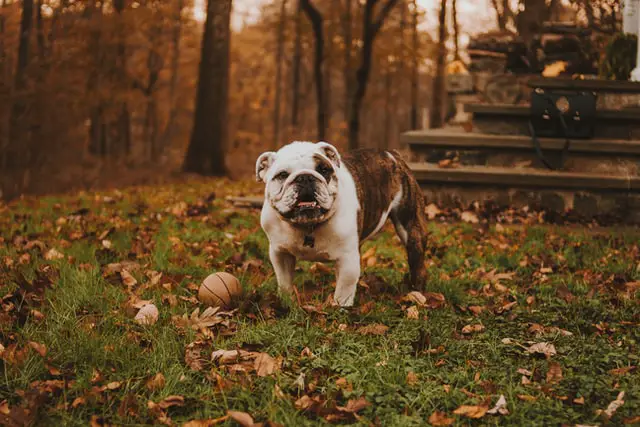Snake bites are scary, especially for a defenseless Bulldog. As with humans, snake bites can be poisonous and even deadly. Therefore, it’s important to know the tell-tale signs of a bite and what to do for snake bite on dog. This will save your pet from the potentially life-threatening effects of the venom.
Bringing your Bulldog to the vet is surely the best solution for snake bites. However, we can’t always buy time to drive the distance. With this, first aid treatments are necessary to fight the dreaded effects.
In this post, I will discuss snake bites on Bulldogs, how to spot them, and what to do right away:
How snake bites harm Bulldogs

Dogs and snakes don’t mix (corn snake, rattlesnake, gopher snake ,etc). Depending on the snake species and your Bulldog’s overall health, a venomous bite can kill anywhere between 1 and 24 hours.
Snake bites will paralyze your dog’s respiratory muscles, which is the main cause of snake bite-related deaths. Aside from that, the venom will also start to kill body tissues, which can lead to up to a third of the canine’s body fluids being lost.
All of these will cause a significant drop in blood pressure. In no time, your Bulldog will succumb to shock and eventual death.
However, you should know that there are literally 3,400 snake species in the world. About 50 species can be found in the United States. Of this number, 30 species are deemed venomous, a combination of rattlesnakes, coral snakes, copperheads, and cottonmouths.
This means that not all snake bites are venomous. Still, you shouldn’t take chances, especially if you didn’t see or capture the snake that bit your dog.
Venomous snakes in the United States
To give you an idea, here are some of the most common venomous snakes you should watch out for:

- Copperhead. This snake belongs to the viper family and is one of the most common snake species in Southeast America. It comes in five subspecies that bear different cross-band patterns. Copperhead bites can be lethal to Bulldogs, though these species are also known to make ‘dry bites’ or those that don’t have venom.
- Western Diamondback Rattlesnake. This snake is sometimes called the Texas Diamondback since it’s often found in forests, deserts, and grasslands. A bite from a Western Diamondback Rattlesnake is highly venomous and can cause severe internal bleeding for both dogs and humans.
- Eastern Diamondback Rattlesnake. This species is one of the largest native species in North America. It releases a large amount of venom on each bite which can cause cramps, spasms, bleeding, and other symptoms. If your Bulldog isn’t treated right away, a bite from an Eastern Diamondback Rattlesnake can lead to death.
- Mojave Rattlesnake. This snake is deemed the deadliest in the North American region. The effects of its venom are similar to that of cobra since it often delays the real symptoms. It gives victims a false sense of security until they start experiencing spasms, weakness, and excruciating pain. In Bulldogs, a venomous bite can turn deadly within hours.
Take note that there are more venomous snakes in America. If you’re taking your Bulldog camping, hiking, or RVing, you should keep it supervised at all times.
How to know if your Bulldog got bitten by a snake
We can’t always keep an eye out on our dogs. If you suspect that a snake has bitten your Bulldog, you must look for the following symptoms:

- Puncture marks from the bite
- Swelling and redness on the bitten area
- Labored breathing
- Drooling and frothing
- Weakness and collapsing
- Trembling and muscle twitching
- Dilated pupils
- Paralysis
Take note that snakes often target their prey’s neck, face, and legs. These are prone areas as some Bulldogs may try to play or bite the snake. However, you should still conduct a full body check since snakes can bite on the torso and other areas.
Most of the time, venomous bites will have more intense swelling than non-venomous ones. However, this isn’t always the case since some dogs may take longer to react to a toxin.
When it comes to snake bites, time is your biggest enemy. You have to act fast before the venom causes irreversible damages to your Bulldog’s body.
Also, I don’t recommend self-medicating a snake bite on your pooch. Unless your dog’s vet approves, it’s still best to bring your doggo to the nearest pet hospital or vet clinic.
What to do for snake bite on dog
If you’re sure that a snake has bitten your Bulldog, you should always treat it as an emergency. It’s best to think of the bite as venomous so that you can seek immediate veterinary help. Even if your dog looks fine, you’ll never know when the venom will start to kick in. By that time, it might be too late for your pet.
Instead of panicking, you must take the following steps instead:
✔️Try to calm your dog

It’s important to keep your Bulldog calm to slow down circulation. You should also stay calm as pets can sense panic, which will just trigger more stress. Your Bulldog should remain immobile while you call the vet.
You should also keep other pets away as this may trigger your Bulldog to move and play. If possible, put your Bulldog in a crate to keep it still and calm. Calming sprays can also help.
✔️Don’t touch the bite area
As much as you want to clean the snake bite, it’s not advisable to touch or wrap it in a tourniquet. Also, never attempt to suck the venom out. This will just make things worse for your dog, not to mention that you may swallow the deadly venom.
If immediate veterinary care isn’t available, you can rinse the wound with flowing water, but don’t rub it. Also, keep the bite area elevated below the heart level. For example, if your Bulldog got bitten on its front paw, you should keep it low to slow down circulation.
✔️Call the vet or any poison control hotline
The moment you discover the snake bite on your Bulldog, you should call the vet right away. This way, you’ll receive professional guidance on how to perform first aid treatment. For sure, your dog’s vet will ask you to take the animal to the clinic as soon as possible.
If the vet can’t be reached, you can call a poison control hotline. These hotlines are equipped to handle all types of toxins, including snake venom.
Here are some of the pet poison hotlines you can call in the event that your Bulldog got bitten by a snake:
- Pet Poison Helpline. You can call them at the hotline number (855) 764-7661. They can help with all poisons on all pet species, including Bulldogs. Just note that they charge an incidence fee of US$65, which already includes follow-up consultations.
- ASPCA Animal Poison Control. The ASPCA Animal Poison Control Center (APCC) is reachable at (888) 426-4435. They also charge consultation fees for a variety of pet poisoning incidents. ASPCA can help you address snake bites on dogs properly.
✔️Observe your Bulldog
While you’re trying to reach the vet or a pet poison hotline, you should keep observing your Bulldog. You should note the symptoms, which can help veterinarians assess the situation.
If your notice that your dog is no longer breathing, you should ask the vet how to administer CPR.
✔️Turn up the AC in your car
Cranking up your car’s air conditioner will help slow down the circulation of your Bulldog’s blood. You can do this while heading to the vet’s clinic. However, I suggest asking the vet over the phone first since Bulldogs aren’t very tolerant of extreme temperatures.
Treatment for snake bites on Bulldogs
The vet will conduct a quick physical exam to find the bite area. Depending on the situation of your pet, the following will be the potential remedies after cleaning the wound:
- Anti-venom. This will be administered if your dog is bitten by a venomous snake. It will help a lot if you can identify the specific species so that the vet can provide the right antidote.
- Antibiotics. If there’s a substantial tissue injury, your Bulldog’s vet can also prescribe antibiotics to combat infection. Still, antibiotics alone can’t neutralize venoms.
- Vaccine. A few vet clinics can offer a vaccine to protect your dog against snake bites. This isn’t an anti-venom, but it will help a lot in reducing the life-threatening effects of a bite. If your vaccinated Bulldog got bitten by a snake, you should still bring it to the vet immediately.
- Pain medications. To manage the inflammation, the vet will also prescribe anti-inflammatory and pain relief drugs.
How to keep your Bulldog safe from snake bites
Snake bites in dogs are highly preventable. If your area is notorious for its snake population, you have to take extra caution when bringing your Bulldog outdoors. Here are some of the things to keep in mind:
- Avoid dense grass. If you’re hiking or camping, avoid areas with dense grass since this is where snakes usually hide. The same goes for big rocks where snakes hide underneath.
- Keep the dog leashed. Whenever you’re taking your Bulldog out, keep it leashed. This will prevent them from chasing after a snake or trying to bite one. Also, you must keep the leash short.
- Always listen. Rattlesnakes often give away their location through the rattling sound they produce. If you hear what seems to be a rattle, you and your dog should go the other way.
- Don’t underestimate dead snakes. Even if the snake is already dead, you should never let your Bulldog play with it. Venomous snakes still have poison inside their bodies. If your dog happens to chew on the snake’s venom glands, it will be poisoned just the same as an actual bite.
- Practice obedience drills. It’s important that your Bulldog knows commands like ‘come’, ‘leave it’, and ‘stop’. This will let you control them in case there’s a snake nearby.
Frequently Asked Questions
Q: Can dogs survive a snake bite without treatment?
A: Regardless if it’s venomous or not, your Bulldog will suffer a lot from an untreated snake bite. If it’s venomous, your dog will succumb to death without treatment. For non-venomous bites, your pet will experience severe swelling and a high risk of infections. This is why you should always consider snake bites as emergencies that require immediate veterinary attention.
Q: How much does it cost to treat a dog for a snake bite?
A: The cost of snake bite treatment for dogs varies widely. It can range from less than $100 or more than $200. The cost largely depends on the severity of the bite and the overall condition of your Bulldog. Aside from that, your location and the clinic itself would affect your bill.
Q: Can dogs survive a Copperhead bite?
A: Most Copperhead bites aren’t lethal, but it doesn’t mean your Bulldog is already safe from the life-threatening symptoms. Most dogs will survive Copperhead bites, but it requires immediate veterinary care to combat the venom and other symptoms.
Q: Are snakes scared of dogs?
A: As wild animals, snakes often avoid humans and pets. But if provoked, these cold-bloodied beings will not hesitate to attack. This is why you should keep an eye on them in the wild while keeping your Bulldog safe and within your control.
Q: Can dogs develop immunity over snake venom?
A: Dogs don’t develop immunity against snake venom. This is why you should bring the pooch to the vet whenever it gets bitten by snakes. Anti-venom shots are often given after a bite has been diagnosed.
Final words
Knowing what to do for snake bite on dog will save your pet from life-threatening consequences. You should always call the vet for proper treatment as soon as possible. After your dog survived the bite, you must practice proper caution to prevent the same incident from occurring. This will also keep you safe from deadly snake bites.

